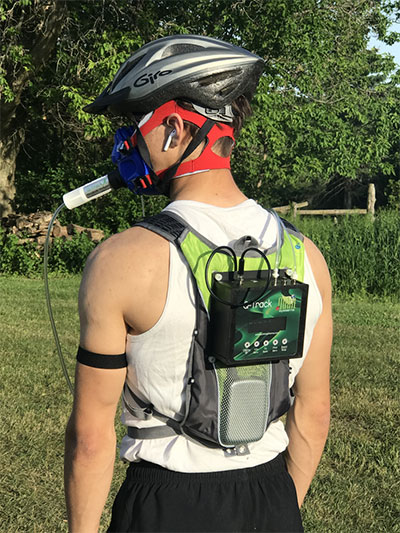Imagine joining a gym or a health club in the not-too-distant future and, immediately after sign up, you are given a test that provides you with an accurate baseline measurement of your fitness. Then, periodically, you are tested again to measure progress.

That’s what Steve Hunt and his colleagues at Qubit Systems hope to make a reality. And Hunt believes that their time in Queen's Partnerships and Innovation's new Growth Accelerator program will help them achieve that goal.
Currently employing 10 people, Qubit was founded 25 years ago, which might make it seem like an odd fit for an accelerator program. But when Hunt talks about why the company wanted to participate, it makes sense. Qubit’s historical business has been building and selling inexpensive testing equipment that can be used for undergraduate teaching or for research, and in virtually any field of biology where scientists are measuring respiration or photosynthesis.
“We’d long wanted to get more into human biology,” he says. Then they had an idea. “The only scientifically proven way to measure fitness is by monitoring a person’s oxygen consumption rate via what is known as a VO2max test.” A low-cost device that could do that would find a market. Perhaps their current academic customers, they thought, but Hunt says, “There are more than 200,000 gyms in the world and the number of people who own a gym membership is over 120 million.” Now THAT’S a market.
A market they knew little about and were trying to crack with a brand-new product. “What we wanted to do could be regarded as a startup,” he says. So, when the chance arose to join the Growth Accelerator program, they jumped at it.
“Going through the Accelerator has given us insights into how we might approach these opportunities,” he says.
Hunt praises Laura O’Blenis and Ariella Lukach from Stiletto, the company hired to develop and deliver the program, as well as the experts that they brought in to cover what any startup hoping to grow needs to learn.
“Virtually everyone had something to say that was new and interesting,” he says. For example, “We had always suspected that we needed a business development person at Qubit. The session on team-building confirmed this.” Other experts explained raising venture capital and selling techniques, and one focused on monetizing data – “If we are successful, we’ll be collecting a lot of data that we could sell to medical companies, even sports companies like Nike.”
“The program covered all the bases I needed to create a strong business plan, one that is not pie in the sky, but backed by numbers,” he says. “I think it’s something that any technology company should engage in if they want to grow their business – because they are going to need it.”
The Wings/Growth Acceleration program was made possible with support from the Government of Canada to Queen’s University through the Federal Economic Development Agency for Southern Ontario and the Scale-Up Platform Project which is led by Invest Ottawa in eastern Ontario and by Queen’s in the Kingston region.
 About Vice-Principal Research
About Vice-Principal Research